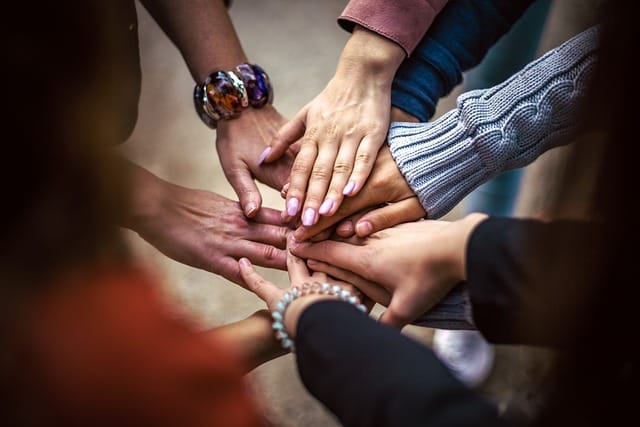Benefits of Teamwork & Project Management Software

Teamwork is the secret ingredient behind every successful project. Whether you’re collaborating on a small task or managing a complex project, the strength of your team dynamics can make or break the outcome. But how do you build a team that works well together? In this article, we’ll explore the power of teamwork, the importance of team dynamics, and how to improve collaboration for better results. Let’s dive into what makes effective teamwork truly work!
What is teamwork definition ?
Teamwork refers to the cooperative effort of a group of individuals team to work together toward a common goal. It’s about combining diverse skills, perspectives, and strengths to create a collective force that is stronger than the sum of its parts. When people work together toward unified aim as a team, they support one another, share responsibilities, and work toward a shared objective, whether it’s completing a task or solving a problem.
Why teamwork important
The importance of teamwork cannot be overstated. In today’s fast-paced, interconnected world, the ability to collaborate efficiently is crucial to success. Strong teamwork helps improve creativity, fosters innovation, and boosts morale. When individuals work together, they can share knowledge, support each other in challenging times, and create a work environment that is more resilient and adaptable.
Did you know? Teams that work well together are 25% more productive than those that don’t
Teamwork in the Workplace
In the workplace, teamwork plays a critical role in ensuring that goals are met efficiently and that challenges are overcome collectively. Whether working on a project, a department task, or a company-wide initiative, teams need to work cohesively to get results. Effective teamwork in the workplace involves collaboration, mutual respect, and constant communication among team members to feel confident.
Teamwork and Organizational Success
A successful team translates directly into organizational success. When teams collaborate effectively, they can tackle complex projects, innovate solutions, and drive progress within the company. An organization with strong teamwork tends to have higher employee satisfaction and lower turnover rates, as employees feel more connected and valued.
Benefits of Teamwork
Teamwork offers significant advantages that contribute to both team success and individual growth. By working together, teams can combine their unique skills and resources, which leads to higher efficiency and better problem-solving. Moreover, teamwork creates an environment of mutual support and shared responsibility, ultimately boosting creativity and enhancing morale. These benefits not only strengthen the team’s ability to achieve goals but also help individuals thrive within the group.
For the Team
Here are some key benefits of teamwork for the team itself:
- Increased Efficiency: Tasks are divided among team members based on their expertise, speeding up the completion of goals.
- Enhanced Creativity: Different perspectives help generate innovative solutions to problems.
- Improved Problem-Solving: Group discussions often lead to better solutions than solo efforts.
- Stronger Team Morale: Achieving goals together boosts team spirit and motivates everyone involved.
For the Individual
Working as part of a team brings several personal benefits:
- Skill Development: Teamwork provides opportunities to learn new skills and improve existing ones.
- Increased Motivation: Collaboration promotes a sense of purpose and encourages individuals to perform their best.
- Personal Satisfaction: Successfully contributing to a team goal creates a sense of accomplishment.
- Improved Communication: Working closely with others enhances individual communication and collaboration skills.
Effective Teamwork Skills
To build an effective team, certain skills are essential for every team member to possess. Effective teamwork skills are those that contribute to working collaboratively with a group and achieving good teamwork. These include clear communication, the ability to resolve conflicts, and working toward a shared objective.
Team members need to understand that good teamwork isn’t just about doing tasks alone but the process of working collaboratively. Each individual’s skill sets should complement one another to enhance the collaborative effort of the team.
Did you know? Teams that invest in skill-building workshops have shown a 30% increase in collaboration effectiveness.
Communication and Collaboration
Communication is the foundation of any good team. Without clear communication, it’s difficult for team members to understand their roles and responsibilities. Effective communication allows everyone to express ideas, voice concerns, and share knowledge. It fosters collaboration and helps in resolving any conflict resolution that may arise.
Working jointly ensures that the team as a whole works towards achieving shared objectives, whether it’s launching a new product or solving a complex issue. In essence, communication and collaboration enable teams to operate smoothly, as they help build trust and align everyone toward a common goal
Problem-Solving Together
Problem-solving together is a key benefit of teamwork. Instead of facing a complex problem alone, a team can break it into smaller tasks and combine their strengths and skills to find creative solutions more effectively.
By working jointly, team members share their expertise and contribute to a collective solution, making it easier to handle complicated tasks. Teamwork isn’t just about completing tasks. It’s about doing so efficiently and creatively.
Characteristics of Effective Teamwork

Effective teamwork is characterized by a set of key elements that ensure teams work together harmoniously and productively. These include:
- Shared Goals: All team members should be aligned working for a common goal, understanding the bigger picture and how their individual efforts contribute to it.
- Trust: A successful team requires trust among its members, which promotes a positive environment where ideas and feedback are welcomed.
- Role Clarity: Each member must have a clear understanding of their roles within the group.
- Camaraderie and Team Synergy: Teams that support one another and create a combined effort thrive on team synergy, which makes the team as a whole stronger than the sum of its parts.
Shared Goals and Trust
Shared goals and trust are at the core of successful teamwork. When each team member is clear about the common objective, they work more efficiently toward it. Having a shared vision unites individuals and develops a spirit of collaboration.
Trust among team members helps create a safe environment where individuals feel comfortable contributing ideas, which is essential for great teamwork. Trust also leads to mutual respect and encourages team members to rely on each other, knowing their contribution is valued.
Did you know? Teams with a high level of trust are 40% more likely to outperform teams with low trust levels.
Role Clarity and Accountability
In any good team, role clarity is crucial. When each team member understands their responsibilities, the team can function more smoothly, and the chances of conflict resolution decrease significantly.
Additionally, accountability is key. Members should be responsible for their assigned tasks and for contributing to the overall success of the team. A team that values teamwork holds each individual accountable to their role, ensuring that everyone works towards the common purpose with a sense of ownership.
Successful Teamwork Elements
The key elements of successful teamwork are what make a team truly effective. These include:
- Collaboration: Working together as a team toward shared goals.
- Communication: Ensuring clear communication to avoid misunderstandings.
- Accountability: Each member must take responsibility for their contributions.
By focusing on these elements, a team working environment is created where each member’s strengths and skills contribute to the collaborative effort of a group
Team Leader Role
A team leader plays an essential role in ensuring that good teamwork happens. The leader is responsible for:
- Clarifying Roles: A good team leader ensures that every team member understands their roles and responsibilities.
- Providing Support: A team leader offers encouragement, guidance, and resources to help the team reach their goal.
- Resolving Conflicts: When disagreements arise, theteam leader is key to managing the situation and keeping the team on track
Supportive Work Environment
A supportive work environment is crucial for developing effective teamwork. It is a place where team members feel valued and encouraged to contribute their best work. In such an environment, individuals feel comfortable sharing their ideas and collaborating openly.
In this environment, team members are empowered to work collectively, knowing that they have the support of their colleagues and leadership. This positive atmosphere makes it easier to address challenges and achieve the team’s goals
Improve Teamwork Techniques
To improve teamwork in the workplace, it’s important to regularly evaluate the team’s processes and identify areas for growth. This includes ensuring that the team is working moving towards a collective purpose, advancing an environment where feedback is encouraged, and making sure that every team member has the skills they need to succeed.
Regular Team Meetings
Regular team meetings are essential for maintaining alignment and improving teamwork. These meetings provide opportunities to discuss progress, clarify roles and responsibilities, and address any issues that may arise. Regular team meetings allow for open communication and ensure that the team is always moving in the right direction.
Feedback and Continuous Growth
Providing consistent feedback helps individuals and teams grow. A team that values feedback and continuous growth allows each member to understand how they can improve, which ultimately leads to better performance. It encourages team members to stay accountable and ensures that everyone is continuously working towards the collective target.
Team-Building Strategies

Effective team-building strategies help enhance the cohesion and trust within the team. These strategies are designed to:
- Strengthen communication and collaboration
- Strengthen group dynamics and synergy
- Improve problem-solving and creative thinking
Activities to Build Trust
Activities to build trust are crucial for enhancing teamwork. These activities can include team retreats, workshops, or collaborative projects that encourage team members to work together in new ways. By strengthening relationships, these activities enhance the team’s ability to collaborate and work moving towards a collective goal more effectively.
Encouraging Team Synergy
Encouraging team synergy means creating an environment where each team member contributes their best, leading to greater creativity and problem-solving. A team that functions with synergy produces better results than individuals working alone. Great teamwork relies on every team member bringing their unique set of skills to the table and working in harmony.
Frequently Asked Questions about the Teamwork
What is the basic concept of teamwork?
Teamwork is the collaborative effort of a group of individuals working together toward a collective target. It requires team members to share their knowledge and skills and contribute their areas of expertise. Good teamwork means that all members of the team work as a team, combining their strengths to achieve success.
How effective is teamwork really?
Teamwork is highly effective when each team member brings their unique skills and knowledge to the table. By working collaboratively, the team can divide complex projects into manageable tasks and solve problems more efficiently. Teamwork creates an environment where team members feel confident and valued, leading to better results.
Why is teamwork important in the workplace?
In the workplace, teamwork is crucial because it allows individuals to combine their efforts, solving problems and achieving goals that would be difficult to reach alone. Working in teams enables people to share their strengths and skills while working towards a common goal. Effective teamwork leads to greater organizational success and productivity.
How do you demonstrate teamwork skills at work?
To demonstrate teamwork skills at work, it’s essential to collaborate with your colleagues by working together towards a common goal. This involves clear communication, sharing individual tasks, and contributing your knowledge and skills. Showing that you can adapt to different roles and support your team members will highlight your ability to work as part of a team.
How does teamwork impact project management success ?
Teamwork plays a critical role in project management by allowing the team to divide complex projects into manageable tasks. Working in a group requires teamwork, where team members collaborate in the direction of a mutual goal. By leveraging each team member’s strengths, teamwork ensures projects are completed on time, within scope, and with the desired quality. Teamwork requires everyone to contribute their unique skills, ensuring a smooth and efficient process.
What are the key factors that influence team dynamics ?
Key factors that influence team dynamics include roles, communication, and how well team members work collaboratively. An individual team with clear goals and mutual trust tends to have stronger group dynamics. An environment where team members feel encouraged to contribute and are supported leads to more successful teamwork.
What do teamwork mean to you?
teamwork is the process that turns individual contributions into collective success. Whether it’s a project at work or a game on the field, teamwork looks like everyone coming together toward a common goal. When team members are encouraged and empowered, they not only feel confident but also perform at their best. So, let’s embrace the power of collaboration, work together effectively, and make great things happen as a team. Ready to take on the challenge? Let’s do it!
If you liked the article, also learn with us about the impact of social media on relationships between individuals.
